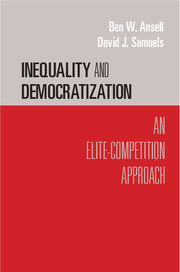Book contents
- Frontmatter
- Contents
- List of Tables
- List of Figures
- Preface
- I Introduction
- 2 Inequality, Development, and Distribution
- 3 Actors and Interests
- 4 An Elite-Competition Model of Democratization
- 5 Assessing the Relationship between Inequality and Democratization
- 6 Inequality and Democratization: Empirical Extensions
- 7 Democracy, Inequality, and Public Spending: Reassessing the Evidence
- 8 Democracy, Redistribution, and Preferences
- 9 Conclusion
- Bibliography
- Index
5 - Assessing the Relationship between Inequality and Democratization
Published online by Cambridge University Press: 05 January 2015
- Frontmatter
- Contents
- List of Tables
- List of Figures
- Preface
- I Introduction
- 2 Inequality, Development, and Distribution
- 3 Actors and Interests
- 4 An Elite-Competition Model of Democratization
- 5 Assessing the Relationship between Inequality and Democratization
- 6 Inequality and Democratization: Empirical Extensions
- 7 Democracy, Inequality, and Public Spending: Reassessing the Evidence
- 8 Democracy, Redistribution, and Preferences
- 9 Conclusion
- Bibliography
- Index
Summary
INTRODUCTION
This chapter tests our elite-competition argument connecting inequality to regime change. We find strong support for our conjecture that income inequality is positively, while land inequality is negatively, associated with transitions from autocracy. We develop these findings using two sources of data on income inequality – one covering 1820–1992 and another, with broader country-coverage, covering 1955–2004 – as well as a variety of measures of democracy. The countervailing effects of land and income inequality on regime transitions show up across historical periods and differing measures of democracy and inequality, and are robust to a range of estimation techniques and sensitivity tests.
This chapter is organized as follows. Section 5.2 briefly summarizes existing empirical research. Since our datasets have different country- and time-period coverage, Section 5.3 then operationalizes our independent and dependent variables and discusses estimation techniques. Section 5.4 contains our empirical tests, and Section 5.5 the conclusion.
QUANTITATIVE RESEARCH ON INEQUALITY AND REGIME CHANGE
An enormous literature has explored the relationship between per capita income, inequality and democracy. One might say that quantitative analysis began with Lipset, given his hypothesis that democratization was only likely where a sizable middle class had emerged. As Rueschemeyer, Stephens, and Stephens (1992) noted, this hypothesis is not precisely about the level of wealth, but about the distributional consequences of economic growth. Most quantitative research, however, has focused on the link between democracy and development per se, partly because of ambiguity in Lipset's argument and partly because no cross-national income inequality data existed until relatively recently.
Early efforts to examine the impact of inequality were, thus, hampered by fragmentary data. All the while, scholars continued to explore the impact of growth per se. Przeworski et al. (2000) prominently suggested that no relationship existed between development and democratization – and also dismissed the idea that inequality and democratization were causally related. Their claim that regime change is exogenous to underlying social forces raised a number of methodological and theoretical questions, and sparked renewed interest in the debate.
- Type
- Chapter
- Information
- Inequality and DemocratizationAn Elite-Competition Approach, pp. 95 - 123Publisher: Cambridge University PressPrint publication year: 2014



